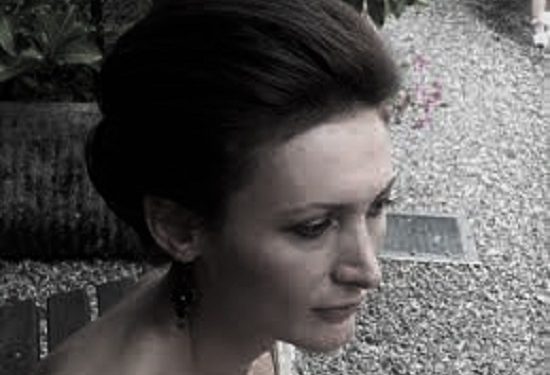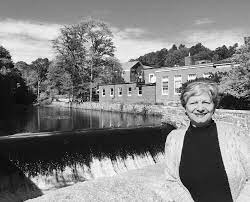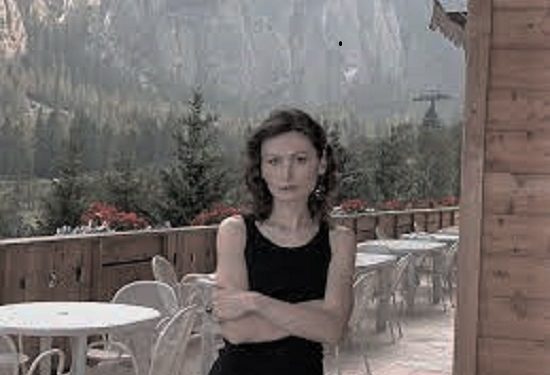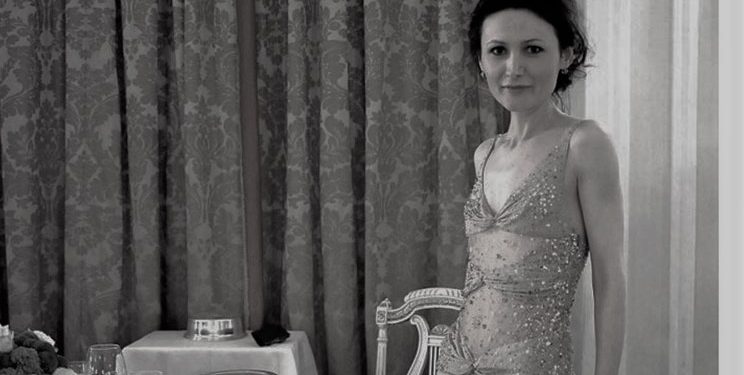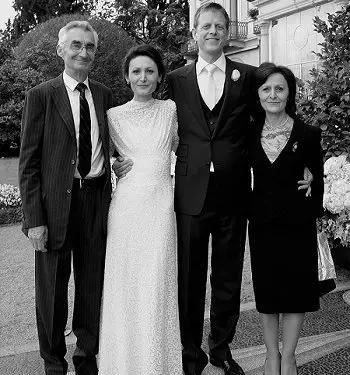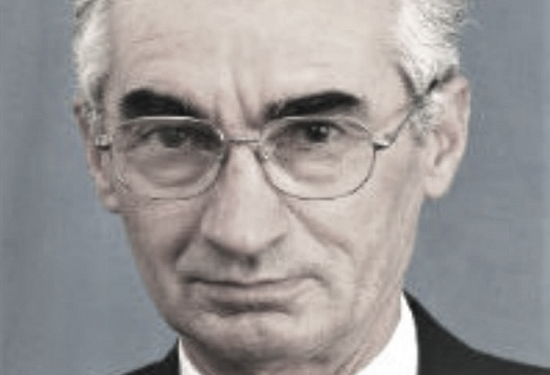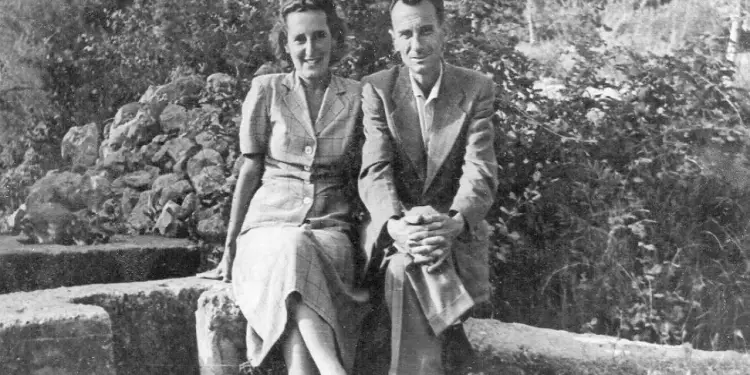By Julia GJIKA
Part Two
Memorie.al / In February 2011, an Albanian friend of our family, Mr. Evgjen Merlika, sent me a sheet of the “New York Times” newspaper, in which his daughter Edira was photographed, leaving the “Ralph Lauren” fashion show, for which she works. The photographer was Bill Cunningham, the 82-year-old most famous reporter of this newspaper. My heart filled with joy, for the fact that a young Albanian girl caught his attention, and even more so, I was curious to know something more about this girl, about whom I had read a few lines, in my father’s memoirs in the book published in Albania, “A Life in a Dictatorship”. Through my father, I got in touch with Edira and discovered that she has been working as a manager in the fashion industry since 2000, after graduating from Bocconi University in Milan.
I have had beautiful moments, like the day Valentino showed the dress I asked for, when I met Ralph Lauren for the first time, when Princess Rosario of Bulgaria chose outfits with me, or when I welcomed Princess Mary of Denmark to the showroom. As for work, I am happy because all my former superiors would like to work together again, and we have a strong bond.
Do you get worried when things don’t go as you plan?
-A little, yes, but then I pull myself together; I try to understand the cause. When you understand the cause, you often have the solution to the problems at hand.
Have you ever sacrificed?
-Of course, and this has made me stronger. Sacrifice is a life lesson. When we lived in Latina, I helped my parents clean their offices during the weekend. Honest work has always had an important place in our upbringing.
During university, I lived with very little money, like many students, so I couldn’t afford to buy many things, even food to eat, but I always thought that what I couldn’t buy when I was studying, I would buy when I worked.
When you settled in the city of Latina, how did the Italians welcome you, what concrete help did you have?
-When we left Albania, we went to Italy, where my grandfather’s brother welcomed us, that is, the son of Mustafa Merlikë, who had fled for health reasons outside Albania during World War II. He and his wife welcomed us in Latina, where they had lived for years.
I left alone with my grandmother, while the rest of the family came a year later. The Italians were kind to us, especially the people of the church, and then those who became friends of my parents. For me, the first year was traumatic. The school programs were very difficult.
I came from another world; I had not studied Italian literature, English, ancient Greek or Latin. The others had taken some of these subjects before. The first day they saw me, they were surprised because they were expecting a black girl (they had never heard of Albania, they thought it was a country in Africa).
When they heard that I had not taken those subjects, they started laughing, convinced that I would not be able to do it. But as Alfieri says; I wanted, I always wanted, I wanted very hard, and so, after 5 years, I graduated from school with the highest grades, much better than all those who laughed at me. Albanian helped me a lot, for Greek and Latin. My grandmother stayed close to me, studied with me every day, my grandfather’s brother helped me with English.
Teachers were amazed at how an Albanian could translate from Latin without a dictionary, better than Italians, who practically have their own language, and how I could know some foreign authors, better than my literature teacher.
How has cultural heritage helped? What do you appreciate about the culture of the Albanian people, from Kruja first, then from Milan?
-Curiosity is one of the main elements that, I believe, have made me move forward. Perseverance and work, never sparing oneself, without giving yourself to exhaustion, also have their part. I don’t know if these can be qualities of a people, or more personal.
Unfortunately, I only saw the city of Kruja, which I had heard so many times about, shortly before leaving Albania, and the feeling that arose in me was more of an emotion, for the fact that I was seeing where my great-grandfather and great-grandmother were born and raised, for the history of their lives, connected to this city, not to my own.
Milan, like Paris, London, Geneva, Istanbul, Rome, Madrid, Barcelona, Moscow, St. Petersburg, Athens, New York, etc., were discoveries for me that I was lucky to make. These cities taught me how important civilization is and how far peoples who have had the fortune to be cradles of culture reach.
Culture translates into love for the country, that is, in architecture and all the visual arts, in respect for man, and everything is related to the way to make life as pleasant and beautiful as possible, raising the values of well-being and the soul.
My favorite city is Paris. The magic of the ‘Place Vendome’ at three in the morning, when it is lonely and empty, has accompanied me for years, when I would return from the office to the hotel, during the weeks I worked in Paris. I could go on with a long list. London is another miracle.
The first time I went I was 20 years old, and the first place I went was the ‘Victoria and Albert’ museum, to see the costume section. Whenever I can, wherever I am, I run to museums, to see costumes, art, and history.
I have not yet had the opportunity to see the Ethnographic Museum of Tirana, but I know our national costumes. They are an important part of the tradition, which we must maintain and appreciate. I am sorry that Albania, in its rush towards “modernization”, forgot to properly protect its historical tradition and architecture. Looking at some of our cities, it seems as if we are rootless.
What did you hear from your parents about your family roots?
-My parents have always been very careful with us children, regarding our family history. At first, when I was just starting to understand, I noticed that in kindergarten, they talked to us about the history of the country in a completely different way than what I heard at home.
Little by little, after my father’s arrest, I realized that the truth was what I heard at home and that I, as a child, had to keep that truth suppressed and not talk about it with anyone outside the family.
Outside the house, there was adoration for communism, inside it, hatred for it. The older I got, the more interesting it was to hear the history of our family and its friends, from the mouths of my grandmother and grandfather or friends.
Every time they spoke, I would curl up on the sofa, so as not to miss a single word. It was a story filled with dignity, love for the nation, for the culture, honesty, respect, sacrifice. How different was the life they talked about before the imprisonment-externations, from the one we lived!
The difficult years in the internment, I believe, had moments of joy?
-The greatest joy was the immense harmony that prevailed in the house. Grandma, grandpa, dad, mom, me, sister and brother, we were 7 people, forming a perfect family, without quarrels, without grudges, only love and generosity, towards each other. This was the shield that protected us from the terrible climate of the communist regime’s war against us.
So for you too, in those difficult years, was there a hectare of sky, days of heavenly peace?!
-Some moments remained in our minds as miracles of God for us: my father’s return from prison and the birth of my brother, along with the death of Enver Hoxha. How can I forget the first moment when I saw the sea, at the age of 10?!
Every time we gathered with my uncles or my father’s uncle’s family, it was a celebration. (It didn’t happen that other relatives came often, because they were afraid). Not to mention the day I left Albania to come to Italy, in September 1990.
Can you tell me any of the most compassionate, or the ugliest, moments that remain in your mind?
-With the sad moments, the list would become very long. The first moment was when my father was arrested. I was very attached to him and when they took him and he never came home, I believe I experienced one of the first traumas of my life. Then I moved to Grabjan, on an October afternoon, on top of a truck trailer and my great-grandmother sitting on a bench, with a sad face.
My sister’s illness, immediately after my father’s arrest, forced my mother to walk to the hospital in Lushnja (the distance to the city was 18 km.) to be close to her one-year-old child. I remember with pain the day we brought Elena home (this is the name of my little sister, after whom my parents immortalized my grandmother Elena). She had forgotten how to lie down in bed, and would only call out for her mother.
I still remember the day when we received news of the death of my grandmother Elena’s mother in Italy in the camp, and after 6 months, the next news, that of the death of this unforgettable grandmother’s brother. I can still hear her groans when she realized that her loved ones in Italy were no longer alive. She had said goodbye to them for the last time in 1943, when she was 23 years old, and it had been 38 years since she had seen them or heard their voice.
There were also bitter moments when, in Grabjan, young children would tease me and my sister with words against my father’s family, who was in prison; when they pulled our hair, cursed at us, insulted us and spat on us, just to humiliate us. I was only 6 years old, my sister Elena, 4.
I remember that one day, after a few years in Grabjan, I returned home crying profusely, because a boy, the son of a communist family, from the top of the village, had stopped me and said terrible words to me, about me and my family…!
Then my mother told me: “When you cry, you make them happy, learn not to cry”! Another time, the same boy stopped me in front of a building, when I was going to my teacher, early in the morning, to get the keys to open the classroom for cleaning. I remembered my mother’s words, gritted my teeth and walked forward to show that I was not afraid. He blocked my way, putting his foot in front of me.
I looked him in the eye and, I don’t know how I found the strength to kick him and run away. He hasn’t bothered me since. Other times I’ve had to earn respect by using my strength. I often asked myself: “Why did these people find pleasure in behaving so harshly and meanly towards us. Towards people we had done no harm to”?
I don’t want to remind you of the difficult times you went through in your childhood, but I think it’s educational for readers to know how you overcame some difficult moments. I heard that your grandmother Elena prayed for all of you. What do you remember about this heroic grandmother, your indomitable father, your sacrificed mother?
-My grandmother prayed a lot. Prayer was the only weapon she had left. Her religion and great faith, I think, kept her alive, during those difficult years. Often, when she was alone, (she believed she was alone, but I, huddled there, listened), she would talk to her mother and brother, as if they were close to her.
My memories of my grandmother are many, and perhaps one day I will have time to write something about her. She was very different from the society we lived in. I remember how polite and respectful she was to everyone she met. When we went to the water tap to fill up, she would greet them and, when she spoke to other women, she would call them ladies.
I can’t forget the faces of these women, who had never heard of being called a lady, but only a friend. There are many other episodes that I will keep for my book, some that were very funny, but they all show that my grandmother came from another world, and whatever she did, this was evident.
She was very concerned about the upbringing of her granddaughters, especially our behavior and cultural formation. One day I heard her say to her grandfather: “Petrit, the girls are growing up, and they don’t know how to play the piano”?! She felt sorry that the communists separated her from her beloved piano, but it was even worse for her that her granddaughters did not have the opportunity to learn the piano, like her.
My father was also and is a very special person. We took his lessons directly from his example. How much love for culture in the family! How shameful, they taught us, that ignorance is, nothing justifies it. My father was very clear that reading was the door to culture, so he always encouraged us towards it.
The library at home was large, and I could read whatever I wanted. I was 9 years old when I started reading works by Hugo, Stendhal, Kadare and ‘The Divine Comedy’, with Gustav Dore’s drawings. Many conversations took place between grandparents and parents on cultural topics, and we children only had to listen. Memorie.al




